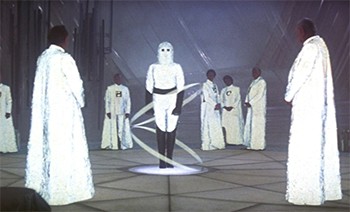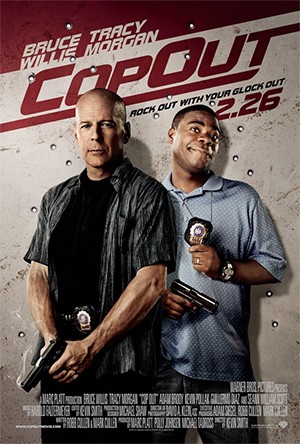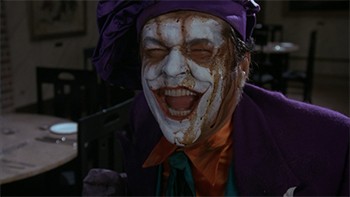5 Iconic Movies With Idiotic Behind-The-Scenes Beefs

To get an idea of what it's like to work on a major Hollywood production, don't imagine, say, cogs spinning quietly in a machine. Instead, imagine a pool game where the balls are the major players' huge, unyielding egos, and the pockets are moving around in a random pattern of chance.
And given some of the idiotic tantrums during the making of the movies below, it's miricle films get made to begin with ...
On Star Trek: The Motion Picture, Camera Parts Had To Be Hidden From The Studio (In A Safe Deposit Vault)
Back in the late '70s, Paramount really needed Star Trek: The Motion Picture to come out on time or lose a tribbleload of money. Unfortunately, the special effects team was less than helpful in achieving that. More precisely, they couldn't come up with anything that was good enough to put in the final movie, so Paramount had to look for a replacement on very, very short notice. Luckily for them, they had special effects wizard Douglas Trumbull, who'd worked on big-budget sci-fi hits like 2001: A Space Odyssey and Close Encounters of the Third Kind, developing digital effects technologies for them. Unluckily for them, he wanted absolutely nothing to do with that movie.

Trumbull and his company Future General Corporation were creating super-advanced tech for the time, like a flight simulator prototype and video game concepts. That Trek movie? It was basically nothing to him since it didn't offer a chance to work on anything new or exciting. Basically, asking him to do it was like asking a chef in a three-star Michelin restaurant if they wanted to take some time off to make you a breakfast burrito.
So he told Paramount execs where they could (boldly) go, and kept working on the tech he was under contract to do. But the whole goddamn Paramount corporation was so obsessed with that movie, they started reassigning his employees to Star Trek and even taking his film equipment and giving it to the movie. He soon realized that the movie would kill his corporation if he let it, he started fighting back.
Trumbull took apart his film cameras and removed the critical movements, making them useless. He then put the movements into a safe deposit vault in Beverly Hills -- that way, even if Paramount took his cameras, they'd have to come begging if they wanted them to work. That basically kept his remaining key assets safe from Paramount's bottomless, Smaug-like greed.
After that, Paramount set up a big meeting with him to get him on board to do the movie's VFX. Paramount CEO Barry Diller kicked things off by thundering about how they were being threatened by a lawsuit and had to finish the movie under any circumstances, then left in a rage. The meeting continued in a tone that was somewhat friendlier to everyone's blood pressure: Trumbull, accompanied by an army of lawyers, used his leverage to get his company's assets and patents back, and he worked out a deal under which he'd do the effects for Trek on terms he liked.
Thus, finishing the movie no one liked.
The Producers Of 1978's Superman Refused To Tell The Director The Budget Or Let Him See The Finished Movie
Generally, the director knows basic information about the movie they're making, such as the budget. This was not the case for the 1978 Superman movie. The producers, Ilya and Alexander Salkind, absolutely refused to tell director Richard Donner the budget, forcing him to stumble in the dark whenever he had to make any decision at all. No, really, he had zero guidance -- they'd just tell him "You can't do this" or "You're going over budget," but they'd never show him the budget or suggest an alternative. It's a miracle he managed to make a movie at all, let alone one of the most beloved superhero movies of all-time.

After a while, he just told them to not even bother coming on set because they were being counterproductive. That kicked off a war -- in his words, "it became us against them." Somehow, things eventually got even worse for Donner.
The editing took place in London and, when Donner and his team had a final cut, they took the workprint (a rough, unpolished version of the film) to Los Angeles so they could have a screening at the studio. At least that was the idea. When they got there, they found out that the Salkinds wouldn't let Donner show anything because they thought the crew was trying to steal the workprint to make a negative from it -- which is a thing that was physically impossible. So the Salkinds had another version of the final cut made from the actual negative, which was in their hands, and shipped that to Los Angeles. It took so long that they couldn't actually screen the movie.
The first time Donner saw the movie he'd directed, he was sitting at the premiere alongside everyone else. All he'd seen before that was a version without sound, back at the editing lab.
As a gesture of kindness to make up for how they'd treated Donner, the Salkinds ... haha, just kidding, the only gesture was of jack and shit. When he was getting ready to go to England to start filming Superman II, Donner got a call from his agent, who had received a telegram from the Salkinds saying they no longer needed him. Spoiler - They did:
John Travolta Got Cast In Pulp Fiction Because Harvey Weinstein Lost A Game Of Chicken
For reasons fully known only to Quentin Tarantino, Quentin Tarantino insisted on casting John Travolta as Vincent Vega in Pulp Fiction. You might think that's pretty straightforward -- Travolta was a big Hollywood star, why not? But in 1994, Travolta's career was clinically dead. Sure, he'd done hits like Saturday Night Fever and Grease, but that was years and years ago. More recently, he'd done the Look Who's Talking series -- a bunch of formulaic, kid-friendly comedies about talking babies ... that opened with racing sperm?
Battlefield Earth was not the lowest point of Travolta's career.
This was the man who should play merciless brain-blowing gangster Vincent Vega, Tarantino demanded. Travolta was game -- he'd asked his agent, his friends, and his wife, who all said he should go for it. That just left Miramax head, Harvey Weinstein, who absolutely did not want to cast Travolta. Daniel Day-Lewis and Bruce Willis both read the script and wanted to play Vega, and Weinstein would take either one over Travolta. He could do Sean Penn or William Hurt too, he said. Anyone but Travolta. He'd let Tarantino make the movie two and a half hours long, give him total authority over the final cut, and let the final choice of actors be his -- but he would not cast Travolta.
On a late-night phone call, Harvey Weinstein, his brother Bob, and Tarantino and his agent Mike Simpson were hashing out the final deal. When they were about to wrap up everything -- at midnight in California, where Tarantino and Simpson were, and 3 AM in New York, where the Weinsteins were -- Harvey suggested they just close the deal and talk about Travolta the next day, "in good faith." This would give the Weinsteins all the power to nix the casting, so Simpson didn't want to close the deal, making Harvey explode on the phone call.
They had two other companies desperate to buy Pulp Fiction, Simpson said. And that was at least partly true -- someone from the company that had produced Reservoir Dogs had tried to get through Tarantino's agency's security that same night, to get to Tarantino before the Weinsteins did. Simpson told Harvey he has 15 seconds to agree and started counting down. Finally, when he got to eight, Bob told Harvey they had to say yes, and Harvey just went, "Okay, fuck it." And thanks to this, we can watch the guy from Grease as a heroin-addicted mob hitman.
While Filming Cop Out, Bruce Willis Challenged Kevin Smith To A Fistfight
On the set of Cop Out, Kevin Smith clashed with Bruce Willis all the time -- because Bruce was a massive movie star. Smith had never worked with a big movie star ("Please do not tell Ben Affleck that I said that") and apparently wasn't equipped to care for Willis' asteroid-sized ego. Willis considered himself so far above ordinary mortals, he didn't even want to sit for a poster shoot, which truly seems like the height of pointless Hollywood snobbery -- posing, while people obsess over you and bring you food and drink, seems like something spoiled prima donnas would love doing.

At one point, when Smith finished a take, Willis said they weren't done yet. Smith then joked, "Okay, everybody, hold on one second. I'm going to go talk to the director," and apparently that was to Bruce Willis what waving a red cloth would be like to a raging bull. Willis asked, "What did you say?" and Smith tried to explain it was a joke, but that wasn't enough. Willis asked him to clear the set -- so he did -- and then, when they were on their own, Willis said, "Do you want to take a swing at me?" Thankfully, there was a speck of reason, and sanity left somewhere in Bruce Willis, and the whole thing ended without a fight. The only damage was sustained by Smith's trailer wall, as Smith punched through it three times after that happened.
The way Smith explains it, it was his fault. He went into the whole with the expectation that the guy he'd be filming with was the guy he saw on movies and TV shows, and things didn't turn out like that. Although it sounds to us like the problem was that Willis was exactly like that, especially as, when Willis asked him if he wants to hit him, Smith says he thought he was in a Die Hard movie.
While Filming Batman, Film Veteran Jack Palance Picked A Fight With Newbie Director Tim Burton
Remember Boss Grissom in the 1989 Batman movie? He was the Joker's boss, the old dude in a suit who looked more like a CEO than somebody leading the mafia. This guy, if you need a clip to refresh your memory.
That scene looks super simple -- the guy's just coming out of the bathroom -- but it was absolute hell to shoot. They shot it on the very first day of filming, and Tim Burton's first big film wasn't off to the most promising start. When Burton called "Action!" the actor, Jack Palance, just didn't come out of that bathroom. Somehow, this turned into a conflict with people yelling; Palance just picked a fight with the newbie director for some reason, angrily telling Burton, "I've made over a hundred films, how many have you made?"
Let's pause here to consider the fact that Palance had a reputation for being totally, absolutely nuts. In his very first movie, 1950's Panic in the Streets, when he shot a scene where he banged another actor on the head with a gun, he used an actual metal gun. They had used a safe rubber gun in rehearsals, but Palance switched it when they shot the scene. The other actor got whacked so hard, he was knocked out for 20 minutes. He was absolutely furious when he woke up and wanted to hit Palance, but thought better because Palance was just too big and strong.
When he got an Oscar, Palance interrupted his acceptance speech to do one-armed push-ups on stage:
Palance didn't do that to interrupt the monotony and give people something to talk about, but because he didn't know what else to do. Really -- when they asked him later why he did it, that's the reason he gave. Anyway, this was probably the guy they should have cast as the Joker if Nicolson had passed.
Which brings us back to the fight on the set, which apparently ended without bad blood, as Burton later said Palance was good for the role. He added that he can't imagine who else could have been Jack Nicholson's boss, and neither could we. Somehow, Palance out-Nicholsoned Nicholson.

Top image: Miramax Films





